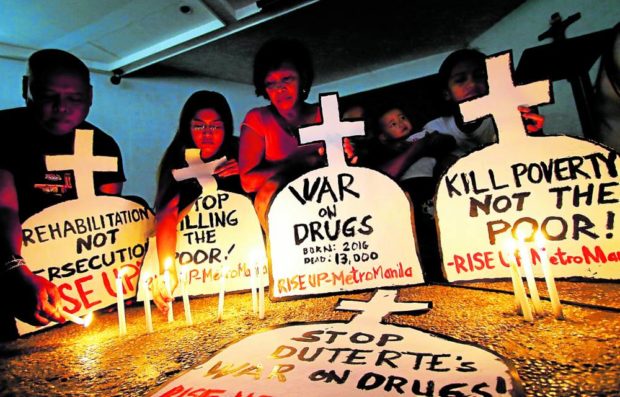
MANILA, Philippines — Should the government refuse to cooperate with the International Criminal Court’s (ICC) prosecutor, the next recourse of the families of extrajudicial killing (EJK) victims is to appeal to the Hague-based tribunal to summon former President Rodrigo Duterte to answer for his alleged crimes.
In an interview with the Inquirer, National Union of Peoples’ Lawyers (NUPL) adviser Neri Colmenares said his group had urged President Ferdinand Marcos Jr. to work with the ICC’s Office of the Prosecutor (OTP) in examining evidence against the previous administration’s bloody war on drugs “but he has shown that they do not want to cooperate.”
“I’m again urging President Marcos to chart his own presidential destiny rather than continue being subservient to President Duterte,” he said.
In a Jan. 26 order, the ICC’s Pre-Trial Chamber (PTC) cleared the way for a full-blown investigation by its OTP.
The chamber acknowledged the efforts made by the government but said it was “not satisfied that the Philippines is undertaking relevant investigations, or is making a real or genuine effort to carry out such investigations and any subsequent criminal prosecutions….”
Justice Secretary Jesus Crispin Remulla called the ICC move an insult to the government while Solicitor General Menardo Guevarra, who had served as Duterte’s justice secretary, said “it is our intention to exhaust our legal remedies, more particularly elevating the matter to the ICC appeals chamber.”
Colmenares said his group planned to adopt Guevarra’s own strategy of using all legal remedies—but in pursuit of the opposite goal.
Those steps include asking the OTP to issue warrants or summonses against Duterte and other alleged architects of the drug war under Article 58 of the Rome Statute, the founding document of the tribunal.
Request warrant or summons
The article allows the OTP to request warrants or summonses if there are reasonable grounds to believe that a person has committed a crime within the jurisdiction of the court, and “the arrest of the person appears necessary… to ensure the person’s appearance at trial.”
Lawyer Kristina Conti, who represented the kin of EJK victims in making filings before the court in 2017, suggested that the government might have backed itself into a corner by declaring it planned to appeal the ICC’s decision while refusing to concede jurisdiction at the same time.
Under Article 18 (3) of the Rome Statute, a state concerned in any investigation may appeal to the appeals chamber of the ICC.
But the Philippine government “has refused to concede jurisdiction over the situation, saying that it is no longer a state party [to the Rome Statute],” Conti noted.
The Philippines ratified the Rome Statute on Nov. 1, 2011, but Duterte, in response to the filing of a complaint for crimes against humanity against him, ordered the country’s withdrawal from the treaty in March 2018, which took effect a year later.
‘Cease and desist’
In 2021, the Supreme Court ruled that withdrawing from the Rome Statute “does not discharge a state party from the obligations it has incurred as a member.”
On Saturday, the Center for International Law Philippines (CenterLaw) called on Mr. Marcos “to cease and desist” from delaying the ICC investigation.
“As a member of the international community, and pursuant to Article 127 of the Rome Statute, it is in the interest of not only the victims but our country for the Philippine government to cooperate with the ICC’s investigation,” the group said.
Based on government data, 6,252 individuals were killed in the drug war from July 2016 to May 2022. But human rights groups contend that the actual number could be three times that figure.

